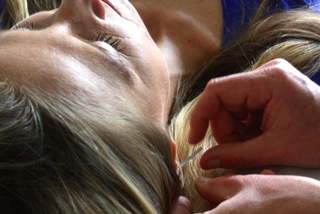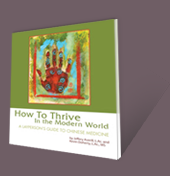Acupuncture and Chinese Herbs
Acupuncture is not just a system for inserting very fine needles into specific body locations to alleviate pain. It is a complete medical protocol focused on correcting imbalances of oxygen and blood flow through the body. From its inception in China more than 2,500 years ago, acupuncture has been used traditionally to prevent, diagnose and treat disease, as well as to improve and maintain general health. Acupuncture was popularized in the United States during the early 1970’s after President Nixon opened relations with China.

How does acupuncture work?
 In the Traditional Chinese Medicine (TCM) system, the body is seen as a delicate balance between two opposing but inseparable forces: Yin and Yang. Within TCM, ideal health is achieved by maintaining a “balanced-state” of Yin and Yang. Disease is due to an internal imbalance of Yin and Yang. This imbalance leads to a blockage or deficiency in the flow of Qi (vital oxygen). Over time, blood flow along internal pathways (known as vessels), can slow and therefore stagnate causing “dis ease” in the body. The vessels can be influenced by needling specific acupuncture points to allow fresh oxygen and blood to pass through. Many times patients will ask me, “why are you putting the needles there?” Think of a light switch being turned on. The light may be located on the ceiling, while the switch for the light is located on the wall. As acupuncture needles are inserted (the light switch turns on) at specific locations and the body becomes activated in a self repair process. Think of the light circuits as the pathways (or vessels) of the body transporting vital oxygen. The insertion of acupuncture needles not only unblocks obstructed areas in the vessels; it re-establishes the energy flow and allows fresh oxygenated blood to reach areas that need healing. Acupuncture treatments can therefore help the body’s internal organs by correcting these imbalances.
In the Traditional Chinese Medicine (TCM) system, the body is seen as a delicate balance between two opposing but inseparable forces: Yin and Yang. Within TCM, ideal health is achieved by maintaining a “balanced-state” of Yin and Yang. Disease is due to an internal imbalance of Yin and Yang. This imbalance leads to a blockage or deficiency in the flow of Qi (vital oxygen). Over time, blood flow along internal pathways (known as vessels), can slow and therefore stagnate causing “dis ease” in the body. The vessels can be influenced by needling specific acupuncture points to allow fresh oxygen and blood to pass through. Many times patients will ask me, “why are you putting the needles there?” Think of a light switch being turned on. The light may be located on the ceiling, while the switch for the light is located on the wall. As acupuncture needles are inserted (the light switch turns on) at specific locations and the body becomes activated in a self repair process. Think of the light circuits as the pathways (or vessels) of the body transporting vital oxygen. The insertion of acupuncture needles not only unblocks obstructed areas in the vessels; it re-establishes the energy flow and allows fresh oxygenated blood to reach areas that need healing. Acupuncture treatments can therefore help the body’s internal organs by correcting these imbalances.
Because the goal of acupuncture is to promote and restore the balance of energy which flows throughout the body, it can be used for a wide variety of conditions: from emotional disorders (anxiety, depression) to digestive complaints (nausea, vomiting, acid reflux, irritable bowel syndrome). It can alleviate pain due to an injury or pain associated with chronic degenerative diseases such as fibromyalgia, rheumatoid arthritis, osteoporosis and general joint pain. Acupuncture can also assist in the treatment of neurological problems like migraines or Parkinson’s disease, or as a rehabilitation strategy for individuals who have suffered a stroke. Respiratory conditions, including sinusitis and asthma have been relieved with acupuncture, as have many gynecologic disorders and infertility. Acupuncture has also proved beneficial for reducing fatigue and addictions, and for promoting overall well-being.
Studies in the U.S. indicate that acupuncture can help relieve chronic low back pain, dental pain, migraine headaches, fibromyalgia and symptoms of osteoarthritis. It has been shown to assist in the treatment of emotional pain syndromes such as post-traumatic stress disorder, as well as controlling chemotherapy-induced nausea and vomiting. It has also demonstrated clinical success in achieving pregnancy when used in conjunction with in-vitro fertilization.

Chinese herbal medicine
Traditional Chinese Herbal Medicine consists of 5,000 plus substances derived from plant, animal, and mineral sources. Over the past 2,500 plus years, an incredibly rich and powerful system of medicine has been created with these substances. Herbal substances are available in the form of herbal teas, liquid extracts, tablets, capsules, granules, lotions, creams, salves, or poultices. A carefully balanced recipe of several different herbs is specifically tailored for each patient.
“My opinion, however, is that they (herbs) are superior 95% of the time to any pharmaceutical drug!”
~ Dr. Robert E. Willner, M.D.




